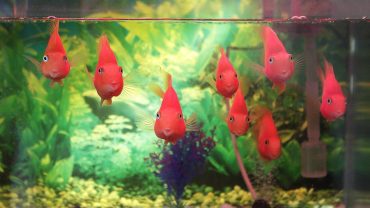Is Having A Fish Tank In Your Bedroom Bad?
Keeping a fish tank in your bedroom can help you relax and fall asleep faster. But setting up a bedside aquarium is not as simple as placing a fish tank next to your bed.
You have to consider exactly where it should go and how it might affect your sleep quality. There are also some potential problems such as smell and humidity that you have to deal with.
But with proper maintenance, having a fish tank in your bedroom should not be an issue.
Is It Okay To Have A Fish Tank In The Bedroom?

Most people prefer setting up a fish tank in the living room since that’s where they spend most of their time while awake. You want the aquarium to be where you can enjoy it most.
A fish tank in the living room is also easier to take care of because it is within easy reach.
If you want the relaxing views of a fish tank while in bed, the bedroom can also work as a home for your fish tank. In fact, it can be beneficial.
If you struggle to sleep, a fish tank can help you relax and beat insomnia.
A fish tank in your bedroom will also raise humidity, which can be helpful for breathing during winter when the air can get quite dry.
That said, there are potential downsides to having an aquarium by your bedside. We are going to discuss them in detail shortly. They include excessive humidity, bad odours, noise, light and health problems.
The most important thing if you want to enjoy a fish tank in your bedroom is to take proper care of it.
Also, if you sleep with your partner, check that they are okay with a fish tank in the bedroom. You may enjoy sleeping to the sights and sounds of a fish tank, but your partner finds it annoying and disruptive.
What To Consider When Setting Up A Fish Tank In Your Bedroom
Tank Size
Normally, people choose a fish tank size based on the number and type of fish they want to keep. Something else to consider is how much room you have.
Check how much space you have in your bedroom for a fish tank. If you don’t have much space, consider a 5 to 10 gallon fish tank. That’s small enough that you can even place it on a desk or table.
If you have space for something bigger, consider getting a 20-gallon or larger aquarium.
Just keep in mind that the bigger the fish tank, the more humidity it will create. If you already live in a humid area, you may want to get a smaller fish tank to avoid raising the humidity too much.
Something else to check is whether the fish tank will cramp up your bedroom too much. Even if you have the space for a large fish tank, it might be in the way. The last thing you want is to bump into the fish tank in the dark or accidentally kick it while you are asleep.
Location
You need to decide where exactly you want the fish tank to go. Of course, you want a location where you’ll get the best views from your bed. But that’s not the only consideration when choosing location.
Because fish tanks are sensitive to temperature changes, avoid placing the aquarium close to vents, near a window, in direct sunlight or close to a heater or radiator.
Also avoid placing the fish tank close to any noise or vibrations.
Something else to consider when choosing where to set up a fish tank is access to power outlets. You’ll need electricity to run the filter, heater and other accessories.
Room Temperature
Fish tanks generally do best in temperatures between 23 and 27 degrees Celsius. If your bedroom stays within that temperature, then you are good to go.
But if your bedroom gets quite cold, you’ll need to invest in a fish tank heater to keep the fish comfortable.
It’s also an issue if your bedroom tends to get hot. There are several ways of keeping a fish tank cool including a chiller, floating ice packs, using a fan, and opening the hood.
Also make sure the fish tank is not in direct sunlight as that could easily cause it to overheat.
Here’s a video with more tips on how to cool a fish tank.
4 Potential Problems Of Having A Fish Tank In The Bedroom
Here are the problems you are likely to encounter with a fish tank in your bedroom. We’ve included the best solutions to each.
1. Excessive Humidity
A fish tank can add a significant amount of humidity to the room. The larger it is, the more moisture it adds to indoor air. Open top aquariums also create more humidity since it’s easier for water to evaporate.
Too much humidity in the bedroom can cause breathing problems, especially if it is also hot. It’s especially bad for people already suffering from asthma and other respiratory problems.
High humidity can also lead to mould and mildew growth in your bedroom. This causes a musty smell. Worse, it’s bad for your health.
Too much humidity can also damage wood furniture by causing rot. The high amount of moisture also poses a danger to electronics and appliances.
Solution
- If your bedroom is already fairly humid or if you are sensitive to humidity, get a small fish tank that won’t raise the humidity by much.
- Small bedrooms experience a bigger increase in humidity from fish tanks. Consider getting a small fish tank if you have a compact bedroom.
- Improve ventilation in your bedroom by opening windows and using a fan to get air moving.
- Consider buying a dehumidifier for your bedroom.
- If you have a large rug or wall to wall carpeting in your bedroom, consider getting rid of it. These soft and porous surfaces trap moisture, causing humidity levels to remain high. They also provide a great place for mould and mildew to grow.
- Get a hooded fish tank to reduce water evaporation.
Tip: Get a digital hygrometer to make it easier to monitor humidity levels in your bedroom. Optimal humidity is 30% to 50%.
2. Bad Odours
A fish tank can get smelly if it is not well maintained. The source is usually decaying organic matter – either fish poop or uneaten food.
A dead fish or an unwashed filter can also introduce bad smells in your bedroom, making it harder to sleep.
Solution
- A well maintained fish tank should not have any bad smell. Proper maintenance involves regularly changing the water, vacuuming the substrate and cleaning or changing the filter.
- Also check that you don’t have too many fish in the aquarium. All that fish waste will make the tank smelly.
- Avoid overfeeding the fish.
- Check if there are any dead fish or rotting plants in the fish tank and remove them.
- If you are experiencing a chemical smell, it could be from the chemicals you use in the fish tank. Store them in another room.
Tip: If you are getting a musty or mouldy smell, refer to the first problem above on humidity. Excessive moisture from the fish tank is what’s causing the smell.
3. Light
Fish tank lights are pretty but they can be disruptive when you are trying to sleep. Most of us sleep best in a totally dark room.
Even a small light on the aquarium can make it harder for you to sleep.
Solution
- Turn off the lights when you go to bed. This is also good for the fish. They need periods of darkness to sleep.
- If you prefer having the lights on when you get into bed, put them on a timer. You can then set the timer to turn off the lights after you sleep to ensure they don’t wake you up in the middle of the night.
4. Noise
While some people find the noise from an aquarium to be relaxing, it can be disruptive to others. The noise in a fish tank usually comes from the air pump or filter.
These noises can be especially disruptive in a small bedroom or if the fish tank is close to your bed.
Solution
- Invest in a high quality pump that makes very little noise.
- Clean the filter often. A dirty or clogged filter can cause noise.
- Adjust the water level in the fish tank to prevent water from the filter from splashing noisily.
- If you cannot get rid of the noise, wear ear plugs or play relaxing sleep sounds to drown out the fish tank noise.
Can A Fish Tank In The Bedroom Make You Sick?
One other potential downside of having a fish tank in your bedroom is that it can make you sick.
High humidity can cause or worsen breathing problems such as asthma. Mould caused by humidity can also affect your health.
Coming into contact with the fish and tank can also cause diseases. Remember a fish tank is teeming with bacteria. They may be harmless, even beneficial, for the fish but dangerous for humans.
One of these dangerous bacteria is salmonella. The path of infection is usually hand to mouth. It’s important to wash your hands with soap whenever you do any work in the fish tank.





